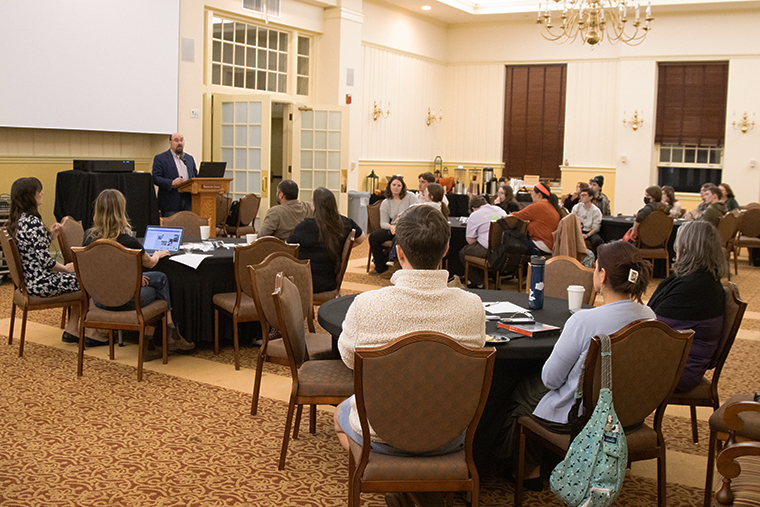'Fighting for the Right to Read' Focuses on Causes and Consequences of Book Bans
Hillel, the Department of Education, Library and Academic Technology, and the Holstein Program in Ethics partner for public program on book banning.

In recent years, the United States has witnessed a surge in book challenges and bans, attempting to pull titles from the shelves of school libraries. These actions strike against intellectual freedom and diverse education. While defenders of these acts of censorship frame them as protective measures for children and communities, librarians, educators, and scholars are increasingly advocating against the suppression of literature, and for the necessity of books with various worldviews.
On October 22, Hillel, a student-run Jewish organization, partnered with the Department of Education, Library and Academic Technology, and the Holstein Program in Ethics to host “Fighting for the Right to Read,” a public program on book banning.
“One of the most fundamental aspects of the freedom to express oneself and the freedom to learn, that life, liberty to have this thing, would be the right to decide for yourself what you choose to pursue, what you choose to learn, and what you choose to ignore,” said Aaron Krochmal, associate professor of biology and faculty advisor for Hillel.
Andrea Boothby Rice, public services librarian in Miller Library, and Erin Counihan, associate professor of practice in education, led the discussion about the causes and consequences of book bans. Boothby Rice shared a historical and political overview of the concept of intellectual freedom as it pertains to library policy, and related it to the importance of librarians upholding the core values of librarianship and the Library Bill of Rights—policies that guide libraries as forums for information and ideas.
“Materials should not be prescribed or removed because of partisan or doctrinal disapproval, and we should challenge censorship in any form,” Boothby Rice said. “We are here to cultivate curiosity, inform ideas, and provide professional world access to information without restriction or censorship.”
Counihan spoke about why it's essential for all to have access to others' stories.
“Never before have so many politicians sought to force school leaders into censoring according to their ideological preferences, including threatening to remove public funding to exact compliance,” Counihan said. “Never before has access to so many stories been stolen from so many children.”
She compared reading to a metaphor of “mirrors” and “windows”: “I see myself in a book that is a mirror…the problem is, if I'm holding it up to myself, I'm also reflecting my own biases, my own experiences, and my own very limited world,” she said. “A window can give me empathy. It can give me understanding, it can give me appreciation of diversity and other experiences.”
Many of the titles under scrutiny—works that include slavery, Indigenous history, gender identity, and sexual orientation—reflect the ever-growing diversity of American literature.
In 2022, Art Spiegelman's graphic novel Maus—which depicts Spiegelman interviewing his father about his experiences as a Holocaust survivor—was banned by a Tennessee school board for “depictions of murders of children and hangings, nudity, inappropriate words, and rough, objectionable language,” Counihan quoted from the school board officials.
Counihan said the suppression of Maus and stories like it “erases the story of people who did not survive. It minimizes the sacrifices of the good people who are involved in helping people. It diminishes celebrations. It diminishes positive images, and it also kind of sets a precedent for removing other stories.”
Counihan encouraged students to engage in advocacy and continue learning despite the recent uptick in censorship.
“Reading widely, talking about it, and teaching about it can allow us to learn, hear, and unsilence voices that may not always have a platform,” Counihan said in closing.
In celebration of Banned Books Week, the English department made a post on their Instagram highlighting the English professors' and student interns' favorite banned books. The featured books were paired with their reason for being banned and resources to learn more about book banning and standing against it.
— Andraya Sudler '26